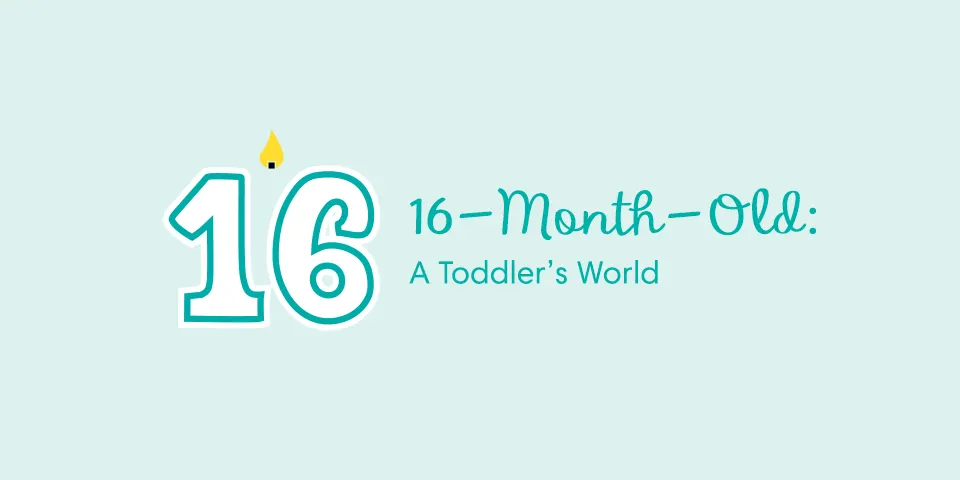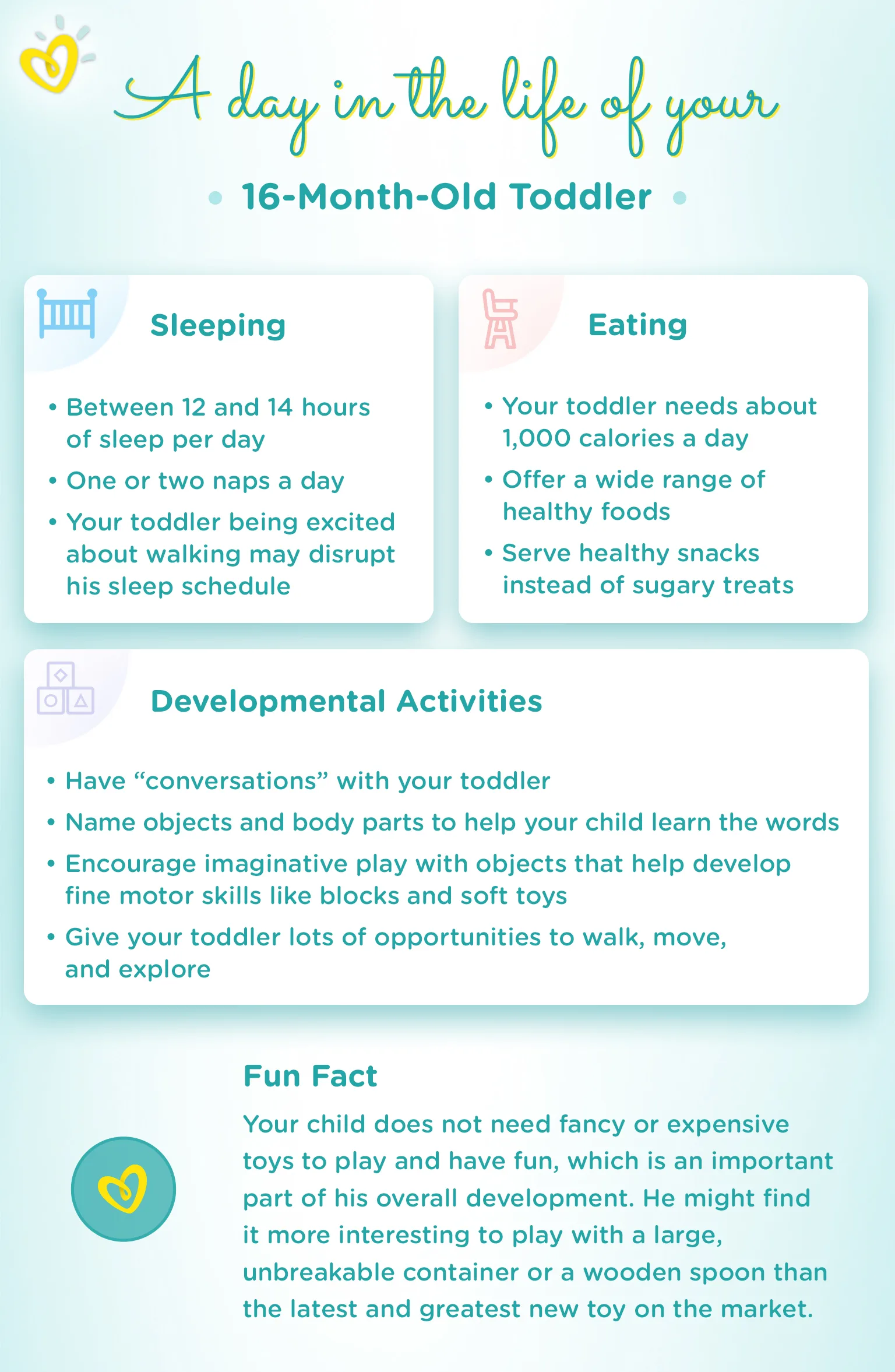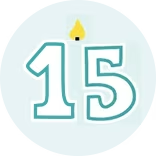16 Month Baby Milestones: A Toddler’s World
As your little one hits the 16 months baby development milestone, he starts believing that he is the centre of attention. It’s normal for kids to develop this trait in this particular period . You might witness this in action when your 16-month old baby acts out after another child reaches for his favourite toy. At times, he may also experience separation anxiety. But there’s no need to stress out. Fortunately, there are ways in which you can help your baby to cope with this challenge at hand. If you want to learn more about 16-month baby development milestones and everything that’s in store for you, then keep on reading!
16 Months Baby Development Milestones
Just like all children, your little one is developing at his own unique pace. Here are some 16-month baby developmental milestones he may reach around this time:
Becoming more sociable and self-centered
Even as your child develops his social skills, becoming more sociable with others including children and adults, he thinks that the world revolves around him. He isn't able to understand just yet that other people have feelings and thoughts that could be different from his own. When other children are around, for example, he may attempt to take their toys but be very possessive of anything he sees as his own. At the same time, your toddler might be intrigued by other children, especially if they are a little older, and try to imitate them. He's likely to be quite physical with other kids and may hit or bite when he becomes upset. To minimize these incidents during playdates, be sure to offer plenty of toys, and hide any of the favourite toys that you know may inspire a battle. Be prepared to act as the referee when needed, but rest assured that this type of behaviour won’t last forever. It’s a natural part of your toddler’s development during this time.
Experiencing separation anxiety
It may be difficult for your toddler to be separated from you around this time, especially when he’s tired, ill, or scared. He may fuss or cry when you’re not around, such as when you're at work or may wake up in the middle of the night and call out for you. Go ahead and remind him that you’re there for him when he needs you and that you’ll be back; eventually, he’ll feel more secure and will understand that you won’t disappear forever and that you’re coming back. Don’t try to sneak off when you have to leave the house or drop him at daycare, as this may have a negative effect and cause him to become even clingier. Brief separations are actually a good thing, as they can help your toddler become more independent over time.
Improving problem-solving skills
Problem-solving is something you’ll see show up in the way your toddler approaches play. He wants to know how things work and might be attracted to mechanical toys, switches, buttons, and knobs. For example, if you’re in an elevator together, he’ll always want to press the button. It’s a good idea to provide him with a range of toys and activities that are challenging for him but not so difficult as to frustrate him. Imitation may also influence your toddler’s problem-solving skills. For example, he may have seen you throw garbage in the trash can, and so he now knows where the trash goes.
How to Support Your 16-Month-Old Baby’s Development
Here are some examples of how you can support your 16-month-old’s development:
Encourage play and social interactions
At this stage of your child's development, playing with another child usually means playing side by side, which is called parallel play. In time, and with practice, toddlers acquire the skills to cooperate and interact during play. To get things going, organize a playdate so your toddler can be with other children around his age. Also, take every opportunity to play with your toddler. Not only is it important for his development, but it offers a wonderful chance for bonding.
Provide simple toys or safe objects to play with
Simple objects like toy blocks, plush teddies or dolls, and puzzles as well as safe household objects like unbreakable containers and wooden spoons help in the development of your toddler’s imagination as well as his hand-eye coordination and fine motor skills. It's fun to watch him pick up a wooden spoon and pretend it is a magic wand, or use it to stir a make-believe cake. Don't feel pressured to buy new toys to keep him engaged and happy—you may even find that when you do your little one’s more interested in the box it came in than the toy itself.
Develop routines
Around this time, it’s important to be consistent and predictable when it comes to your toddler’s daily schedule. With a reliable structure in place, your toddler has easier time learning rules and expected behaviours. To accomplish this, create a daily routine and stick to it when possible. For example, having bedtime at the same time every evening naps at a regular time, and mealtimes and snacks offered around the same time each day. Your child will come to expect this, and it might help him develop good habits.
Play music
Playing fun or calming music for your toddler may have a positive effect on his emotional well-being. Experts believe that playing calming music can help with mood, sleep, stress, and anxiety.
Set boundaries
You may need to establish some physical and behavioural boundaries and limits for your toddler around this time. He’s at the age where he wants to get into everything, which may create unsafe scenarios—like pulling open drawers that could fall on him, opening kitchen cupboards that may store chemicals, or sticking his fingers in electrical outlets. First, what you can do is to make sure these areas are baby-proofed. Then, when you see him headed toward trouble, redirect his attention: play a game with him, or sit him down on your lap for storytime. It will be hard trying to anticipate your toddler’s every next move, but it will be worth it in the long run.
Introduce rhymes
You remember this one from your childhood: "Humpty Dumpty sat on a wall. Humpty Dumpty had a great fall." Not only are these rhymes fun to say or sing with your toddler, but they serve as an important mental exercise. Learning rhymes familiarizes him with sound structures as well as letters. When rhymes and poems are recited and read over and over, your child starts to realize that certain sounds and letters go together—which is an early step on the road to reading!
Mealtimes and Menus for Your 16-Month-Old
For a 16-month-old, three small meals and two snacks a day are typically the norms, but you may find that your little one is hungrier some days and wants to skip a meal or a snack occasionally on others.
When it comes to mealtime, offer your little one a few nutritious options with a variety of tastes and textures, and then let your toddler pick. You might be surprised to learn that when your toddler is given the choice of a range of healthy foods, over the course of a few days he will eat a balanced diet that matches his activity levels and metabolism.
Special Diets
Feeding your toddler can be challenging from time to time, and if your family adheres to a special diet, like a vegetarian or vegan one, you may need to take extra care to make sure he's getting the nutrients he needs. Your toddler's healthcare provider or a registered dietitian can help you put together a menu plan for a healthy diet that meets your growing child's requirements for calories and nutrients, and you'll learn which food sources are best to supply extra vitamins and minerals.
In some cases, your provider may recommend you serve fortified foods like iron-fortified cereals and grains to ensure your toddler gets all the nutrients he needs. In other cases, the provider may also recommend dietary supplements. Follow your provider's advice to ensure your toddler gets everything he needs to grow and thrive.
16-Month-Old Toddler Sleep Schedule
As each child is different, the sleep patterns of your little one may be quite different from another toddler. Generally, at 16 months, your child may sleep anywhere between 12 and 14 hours a day, which includes one or two naps.
You may find that your toddler is resistant to going to sleep at bedtime, especially if he’s just been doing some exciting activities that have taken up all his attention. Establishing a nightly routine that helps him wind down, such as having a bath and then reading a book, may help him settle more easily at night.
A Day in the Life of Your Toddler
Here’s what a regular day with your toddler might look like in your home:
Your Toddler’s Health and Safety: Dealing With the Common Cold
At some point, your child will come down with a cold, especially if she’s in regular contact with other children, either at the playground or in daycare. Even though there is no medication that prevents or cures the common cold, there are things you can do at home to keep your child comfortable as she recovers.
Here’s what to do if your child has cold or respiratory symptoms like a stuffy or runny nose, cough, and/or fever:
Make sure she gets plenty of rest and drinks lots of water or other non-sweetened liquids
If your child has a stuffy nose, you could use saline nose drops or spray to offer some relief
Use a cool-mist humidifier in your toddler’s bedroom to help soothe her airways, especially if she has a cough, so she can breathe more easily
If your child has a fever, her healthcare provider may recommend that you give a single ingredient over-the-counter medication such as acetaminophen or ibuprofen to help bring her temperature down and keep her more comfortable. If your child has a fever of over 103 degrees Fahrenheit that lasts for more than 24 hours, call her healthcare provider as soon as possible.
Always check with your child’s healthcare provider before giving your toddler any medicine, and to make sure you're giving the correct dosage.
FREQUENTLY ASKED QUESTIONS
During this month, your 16-month old may be able to do things like:
• Pick up a ball or another object that is in motion
• Take apart a toy and put it back together again
• Say a number of single words
• Follow simple instructions you give.
Keep in mind that each toddler develops at a unique pace, and your little one may develop these skills a little earlier or later than this.
Development Tips for Your Toddler This Month Here are some different ways you can help boost your 16-month-old toddler’s development:
Offer warm physical contact. Expressing affection through loving, physical contact helps build your toddler’s sense of security, especially when it’s done consistently. Take every opportunity to hug your little one and cuddle, such as when you're reading a story together.
Be attentive to your toddler. Each child has their own personality, rhythm, and mood. Understand your 16-month-old’s temperament and respond to them accordingly, even if they're upset; if it’s required, use an appropriate level of discipline without yelling or spanking. Being consistent with your actions and reactions is important for them to understand the difference between right and wrong.
Listen for questions and ask questions. Children are highly curious around this time. Your toddler will be ready to absorb knowledge like a sponge. Let them ask questions and do the best you can to answer without dismissing them. Then, follow up by asking questions; this exchange can help stimulate their decision-making skills as well as language development.
Play music in the house. As mentioned above, this age is a great time to say or sing nursery rhymes, or to sing or play other music. Playing fun or calming music for your toddler may have a positive effect on their emotional well-being. Experts believe that playing calming music can help with mood, sleep, stress, and anxiety.
Items You’ll Need This Month Here’s a list of baby products you might be using this month, or may still need to purchase:
Toddler car seat. Check that your current car seat still meets your child’s needs. If not, you may need to upgrade to a toddler-specific car seat this month.
Diapers, wipes, and diaper rash cream. A good supply of diapers and wipes is never a bad idea—and have some diaper rash cream just in case.
Child-proof cabinet locks. Your child is getting better at exploring and getting into things, so it's smart to install locks to keep certain cupboards off limits. You might also like to keep various doors locked, like ones leading to the garage, the laundry room, and the basement, for example.
Baby gates. These may be a key part of your child-proofing efforts now that you have an active toddler in the house. Use baby gates to block access to stairs or even certain rooms.
Humidifier. A cool-mist humidifier can help improve the air quality in your toddler’s room and may come in handy if they have any respiratory symptoms or illness.
Baby thermometer. Your 16-month-old may come home from day care with more than just new fridge art! Your child will be susceptible to catching a cold from other children, care givers, and even their siblings. Keep a baby thermometer on hand, as you never know when you’ll need to use it.
Your Life as a Parent: Making Comparisons
As a parent, it is normal to compare your child’s development to that of others. But here’s what you need to remember - each child is different and unique. Everyone develops at his or her own pace. It might be that your little one is ahead in one particular area but a work-in-progress in another. All of which proves that developing into a unique person is a natural part of our life. There are no set rules! So, it’s best to not compare your baby to others, or even to one of your older children who may have developed at a different pace.
We understand that unwanted and unsolicited advice from your friends, family members or other parents can get to you. It’s best to block it out. Rather, you should simply consult with your baby’s doctor to make sure that your 16-month-old baby’s development is happening in a healthy manner.
Checklist for This Month
□ Update your medicine cabinet. Double-check that your medicine cabinet contains up-to-date, unexpired first-aid supplies and any medicines your little one may need. It’s also a good opportunity to check that your car has a well-stocked first-aid kit for when you’re out and about. When you do this check, make sure you safely dispose of any expired medicines and purchase any items you may be running low on.
□ Check on your toddler’s seasonal clothes. Your child may need bigger sizes of seasonal clothes such as coats or shorts. Take advantage of any end-of-season sales and buy the next size up.
□ Schedule playdates. It’s a good idea to organize some playdates with other children of a similar age, as this may help with your toddler’s social development. You could meet up with some of the neighborhood children at the local playground or with children from day care at the park over the weekend. Be sure an adult is present to supervise the children.
□ Size up or switch the style of your toddler’s diapers. As your child becomes more mobile, wiggling and exploring the house as they discover the world around them, you might consider changing to Pampers Cruisers, which are made for active toddlers and feature a unique fit that moves with your toddler.





